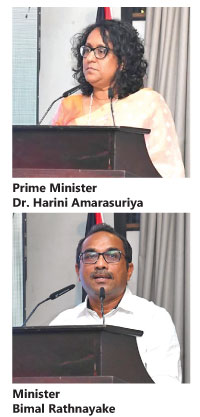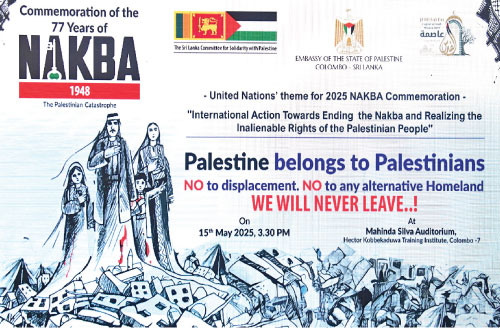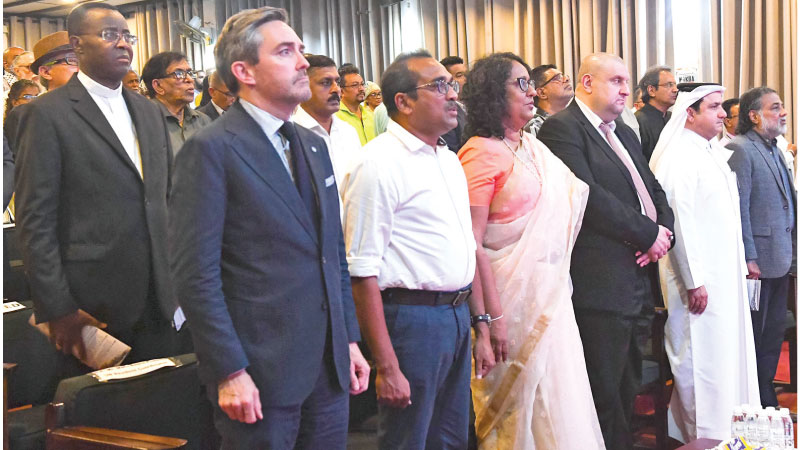 Rarely does Sri Lanka’s fractious Parliament speak with a single voice, yet last week Cabinet Ministers, Marxists, Sinhala-Buddhist nationalists, Tamil lawmakers and Muslim party leaders, gathered in Colombo to mark the 77th anniversary of the Nakba, and to demand justice for Palestine.
Rarely does Sri Lanka’s fractious Parliament speak with a single voice, yet last week Cabinet Ministers, Marxists, Sinhala-Buddhist nationalists, Tamil lawmakers and Muslim party leaders, gathered in Colombo to mark the 77th anniversary of the Nakba, and to demand justice for Palestine.
From pleas for an immediate ceasefire to calls for sanctions and humanitarian corridors, every speaker framed Gaza’s agony as an affront to Sri Lanka’s own anti-colonial ethos. The unprecedented consensus, forged amid a divided election season, shows how the Palestinian struggle continues to knit together this island’s competing parties under the banner of universal human rights.
 Sri Lanka’s political parties don’t usually see eye to eye on anything, but they spoke with one voice last week when the Embassy of the State of Palestine and the Sri Lanka Committee for Solidarity with Palestine marked the 77th anniversary of the Nakba.
Sri Lanka’s political parties don’t usually see eye to eye on anything, but they spoke with one voice last week when the Embassy of the State of Palestine and the Sri Lanka Committee for Solidarity with Palestine marked the 77th anniversary of the Nakba.
Cabinet ministers and Marxists, Sinhala-Buddhist nationalists, Tamil legislators and Muslim party leaders gathered in Colombo on May 15 to remember the expulsion of Palestinians from their homeland in 1948 and to condemn the continuing siege of Gaza, where around 53,000 people have been killed since October 2023.
While there were tactical differences in their proposals, with some pleading for diplomacy, others for stronger action and sanctions, every speaker insisted that for Sri Lankans justice, human rights, self-determination and an independent Palestinian state are non-negotiable.
“A massacre of innocents”
Minister Bimal Rathnayake, a prominent minister of the National People’s Power (NPP) Cabinet and Co-Chairman of Sri Lanka Committee for Solidarity with Palestine (SLCSP), speaking first, said Sri Lanka’s solidarity is rooted in its own anti-colonial experience. He described Gaza’s daily bombardment as “a massacre of innocents” and said that attempts to redraw Middle-East borders through what he called “quiet ethnic cleansing” would erode the moral authority of every international institution.
He demanded for “an immediate and full ceasefire, the lifting of the siege and full accountability for war crimes”. He said that Sri Lankans cannot “watch an entire people face genocide and displacement while hiding behind procedural niceties”.
“One Cholera outbreak away from catastrophe”
The newly appointed Palestinian Ambassador Ihab I. M. Khalil, referring to the Nakba as “the founding trauma of modern Palestinian identity,” said that the plight of the two million Gazans “one Cholera outbreak away from catastrophe,” can be traced in a straight line from the 750,000 refugees of 1948.
He said the international community must open a humanitarian corridor, push for forensic investigations of alleged war crimes, the withdrawal of occupation forces from Gaza and the West Bank, and a guarantee that Jerusalem will serve as the capital of a sovereign Palestinian state. He thanked Sri Lanka for its recent contribution to the Gaza Children’s Fund.
Divergent fates
Prime Minister Dr. Harini Amarasuriya tied Palestinian dispossession to the moment of Sri Lanka’s own birth. “We gained Independence in February 1948; Palestinians lost their homeland in May of the same year,” she said, adding that the lesson of those divergent fates is that sovereignty must be universal or it will become transactional.
She listed Colombo’s historical milestones, the opening of a PLO office in 1975, consistent votes for Palestinian resolutions at the United Nations, emergency consignments of Ceylon Tea during past crises, and promised to push Gaza onto the agenda of the Non-Aligned Movement Summit later this year.
She said that there can be no “equivalence between an occupying power and an occupied people.”
Support transcends political divides
Opposition Leader Sajith Premadasa, often a fierce critic of the NPP said, “On Palestine, there is no Government and Opposition.
Sri Lanka’s support transcends political divides, unified in seeking justice for Palestine.”
Premadasa said Sri Lanka should champion Palestinian rights within the UN, and that Sri Lankans should call on Israel to cease aggression, end humanitarian law violations, and recognise Palestinian sovereignty.
“A lasting peace in the Middle East requires dialogue, compromise, and unwavering commitment to justice. Sri Lanka will actively support international efforts, affirming our solidarity with Palestine,” he said.
Time to act
Deputy Speaker Rizvie Salih said Parliament should unite as representatives of our people who believe in justice and decency and pass resolutions that call for peace in Gaza. Sri Lanka can lead delegations that push for humanitarian aid, “Let us be counted among those who stood up and not turn away to the Government of the world. It is no longer enough to express concern. It is time to act. Condemnations without consequences are meaningless.”
Sri Lanka’s voice carries weight
Muslim representatives Sri Lanka Muslim Congress (SLMC) leader Rauff Hakeem and Rishad Bathiudeen of the All Ceylon Makkal Congress (ACMC) called for urgency. Hakeem rebuked what he called the Foreign Ministry’s “episodic outrage,” comparing its rapid condemnations of attacks in Europe to what he perceived as a cautious, almost hedged tone on Gaza. Bathiudeen, drawing on his own memories of wartime displacement in Sri Lanka’s North, stressed the demographic stakes: two-thirds of Gaza’s fatalities are women and children, he said.
Both of them said that Sri Lanka’s voice carries weight precisely because it is not party to great-power alignments; neutrality, they said, obliges active mediation rather than passive commentary.
Hakeem also called on the Government to stop sending Sri Lankan workers to Israel. Israel is importing workers to replace the Palestinians who were once employed in its agriculture and industries.
Unconditional ceasefire
Lanka Podujana Peramuna (SLPP) representative Rishad Mahroof said that former President Mahinda Rajapaksa championed the cause of Palestine at a time when it was not a fashionable trend. Rajapaksa has assisted the Palestinians, not only through solidarity at international for a bit also through aid. The SLPP stands for an unconditional ceasefire and any settlement excluding Palestinian Statehood would be “a recipe for unending war.”
Slaughter continues
All Ceylon Tamil Congress leader Gajendrakumar Ponnambalam said technological advances have made the world’s citizens direct witnesses to atrocities unfolding in real-time. Ponnambalam said despite global awareness of these violations there is a lack of decisive international action. “Despite this being the first genocide live-streamed onto our mobile devices 24/7, the slaughter continues uninterrupted for 19 months,” he said.
Sovereignty
Veteran journalist and Vice President of the Sri Lanka Committee for Solidarity with Palestine, Ameen Izzadeen, tasked with concluding the ceremony said a small nation preserves its sovereignty only by defending the sovereignty of others. He said that Colombo’s consistent record, from recognising Palestinian statehood at the UN to shipping aid today, has earned praise across the Global South. He said that the solidarity expressed by diverse political parties is an indication that the tragedies unfolding in Gaza are repulsive to the overwhelming percentage of human beings.
What explains the ease with which ideological arch-rivals agreed on Palestine when they cannot agree on the simplest of legislations? Part of the answer lies in Sri Lanka’s post-colonial self-image. From the early 1950s, successive Governments, socialist, conservative or populist, have treated decolonisation as a shared civilisational story, with the Palestinian struggle serving as a potent contemporary chapter.
That narrative meshes with the country’s long-standing commitment to the Non-Aligned Movement, whose charter links anti-imperialism to multilateralism. Standing with Palestine, therefore, reinforces Colombo’s claim to principled neutrality, a valuable currency when courting aid from Washington, Beijing and New Delhi alike.
 This unity also serves domestic purposes. With Muslims comprising roughly one in ten citizens, cross-party endorsement of Palestinian rights blunts extremist rhetoric that might otherwise fracture Sinhala-Muslim relations. Moreover, references by Sinhala and Tamil politicians to their communities’ wartime suffering permits them to frame Gaza’s ordeal as a mirror of Sri Lanka’s own past, transforming foreign policy into a site of shared memory rather than mutual blame.
This unity also serves domestic purposes. With Muslims comprising roughly one in ten citizens, cross-party endorsement of Palestinian rights blunts extremist rhetoric that might otherwise fracture Sinhala-Muslim relations. Moreover, references by Sinhala and Tamil politicians to their communities’ wartime suffering permits them to frame Gaza’s ordeal as a mirror of Sri Lanka’s own past, transforming foreign policy into a site of shared memory rather than mutual blame.
Yet sentiment alone will not alleviate Gaza’s catastrophe. Several concrete proposals emerged during the evening, from institutionalising oversight of Sri Lanka’s voting behaviour at the United Nations, to providing an economic lifeline.
Implementing these ideas will not be easy. Cash-strapped after last year’s debt restructuring, convincing voters to underwrite foreign aid may prove politically costly. And persuading Israel to accept third-party supervision is beyond Sri Lanka’s unilateral capacity. Yet, the very fact that such proposals surfaced, without partisan heckling, shows that Palestine has become the rare issue on which Colombo’s fractious polity permits long-term planning.
The stakes for Palestinians could scarcely be higher. United Nations agencies have warned that Gaza is on the verge of a catastrophe, with acute malnutrition spreading among children and the war increasingly affecting the West Bank.
By speaking with one voice for Palestine, Sri Lanka’s politicians momentarily shelved their rival agendas and affirmed a core principle of their republic’s foreign policy. This is also an indication that most of the world does not believe Israeli claims that its Gaza campaign is a lawful act of self-defence triggered by Hamas’s October 7, 2023 attacks, that it targets only militants, and Gaza’s high death toll on Hamas’s practice of embedding fighters and weapons in residential areas, schools and hospitals.
Whether they now turn principle into policy will determine whether the Nakba commemoration becomes another annual lament or the catalyst for a modest but meaningful diplomatic contribution to ending a war that has already claimed far too many lives.






